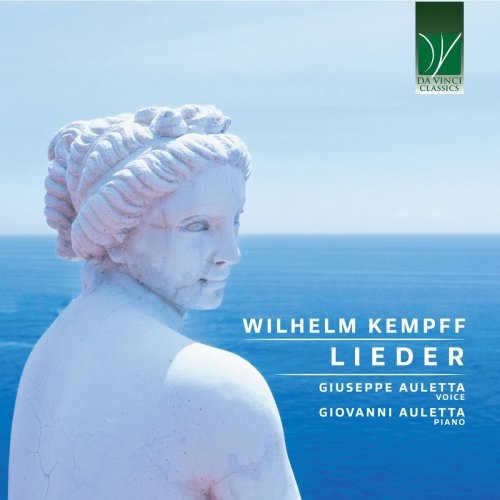
Giuseppe Auletta - Wilhelm Kempff: Lieder (2023)
BAND/ARTIST: Giovanni Auletta, Giuseppe Auletta
- Title: Wilhelm Kempff: Lieder
- Year Of Release: 2023
- Label: Da Vinci Classics
- Genre: Classical
- Quality: FLAC (tracks)
- Total Time: 54:18 min
- Total Size: 220 MB
- WebSite: Album Preview
Tracklist:
01. Vier Lieder aus Alten Zeiten: No. 1, Schlafest du, Geliebter mein:
02. Vier Lieder aus Alten Zeiten: No. 2, Der Kuß
03. Vier Lieder aus Alten Zeiten: No. 3, Sommer ohnegleichen
04. Vier Lieder aus Alten Zeiten: No. 4, Aus den ‘Troerinnen’: Gebet des Euripides
05. Acht Lieder nach Goethe: No. 1, Wandrers Nachtlied (a)
06. Acht Lieder nach Goethe: No. 2, Die Freuden
07. Acht Lieder nach Goethe: No. 3, Die Zikade
08. Acht Lieder nach Goethe: No. 4, Mailied
09. Acht Lieder nach Goethe: No. 5, Verloren
10. Acht Lieder nach Goethe: No. 6, Gefunden
11. Acht Lieder nach Goethe: No. 7, Nachtgedanken
12. Acht Lieder nach Goethe: No. 8, Wandrers Nachtlied (b)
13. Sechs Lieder nach Conrad Ferdinand Meyer: No. 1, Der römische Brunnen
14. Sechs Lieder nach Conrad Ferdinand Meyer: No. 2, Neujahrsglocken
15. Sechs Lieder nach Conrad Ferdinand Meyer: No. 3, Unter den Sternen
16. Sechs Lieder nach Conrad Ferdinand Meyer: No. 4, Der Gesang des Meeres
17. Sechs Lieder nach Conrad Ferdinand Meyer: No. 5, Auf dem Canal grande
18. Sechs Lieder nach Conrad Ferdinand Meyer: No. 6, Jetzt rede du!
01. Vier Lieder aus Alten Zeiten: No. 1, Schlafest du, Geliebter mein:
02. Vier Lieder aus Alten Zeiten: No. 2, Der Kuß
03. Vier Lieder aus Alten Zeiten: No. 3, Sommer ohnegleichen
04. Vier Lieder aus Alten Zeiten: No. 4, Aus den ‘Troerinnen’: Gebet des Euripides
05. Acht Lieder nach Goethe: No. 1, Wandrers Nachtlied (a)
06. Acht Lieder nach Goethe: No. 2, Die Freuden
07. Acht Lieder nach Goethe: No. 3, Die Zikade
08. Acht Lieder nach Goethe: No. 4, Mailied
09. Acht Lieder nach Goethe: No. 5, Verloren
10. Acht Lieder nach Goethe: No. 6, Gefunden
11. Acht Lieder nach Goethe: No. 7, Nachtgedanken
12. Acht Lieder nach Goethe: No. 8, Wandrers Nachtlied (b)
13. Sechs Lieder nach Conrad Ferdinand Meyer: No. 1, Der römische Brunnen
14. Sechs Lieder nach Conrad Ferdinand Meyer: No. 2, Neujahrsglocken
15. Sechs Lieder nach Conrad Ferdinand Meyer: No. 3, Unter den Sternen
16. Sechs Lieder nach Conrad Ferdinand Meyer: No. 4, Der Gesang des Meeres
17. Sechs Lieder nach Conrad Ferdinand Meyer: No. 5, Auf dem Canal grande
18. Sechs Lieder nach Conrad Ferdinand Meyer: No. 6, Jetzt rede du!
Wilhelm Kempff was born in Jüteborg (Brandenburg) on November 25, 1895 into a family of musicians who contributed to the growth of an extraordinary musical talent. He possessed a natural predisposition both for keyboard instruments and for composition, which manifested itself early, as shown by a recording made by his father, musical director at the church of San Nicola in Potsdam.
In fact, Wilhelm Kempff began to perform when he was still a child, and already in 1904 at the admission exam at the Royal Academy of Arts in Berlin, the very young boy was able to play numerous preludes and fugues from the Well-Tempered Clavier by Bach and perform very complex transposition exercises.
The young talent was entrusted to the care of Heinrich Barth who had already studied piano and composition with Hans von Bülow and Robert Kahn from the school of Brahms. His brilliant course of studies led him to receive the Mendelssohn Prize as the best graduate in both disciplines.
His dazzling career began as a virtuoso of the organ as well as the piano. His first success came when, at an early age, he performed on a successful tour of Scandinavia with the Berlin Cathedral Choir. His greatest admirer and patron was the bishop of Uppsala, Nathan Sœderblom, to whom the young composer dedicated his Fantasy and Fugue for organ in D major.
In fact, Wilhelm Kempff began to perform when he was still a child, and already in 1904 at the admission exam at the Royal Academy of Arts in Berlin, the very young boy was able to play numerous preludes and fugues from the Well-Tempered Clavier by Bach and perform very complex transposition exercises.
The young talent was entrusted to the care of Heinrich Barth who had already studied piano and composition with Hans von Bülow and Robert Kahn from the school of Brahms. His brilliant course of studies led him to receive the Mendelssohn Prize as the best graduate in both disciplines.
His dazzling career began as a virtuoso of the organ as well as the piano. His first success came when, at an early age, he performed on a successful tour of Scandinavia with the Berlin Cathedral Choir. His greatest admirer and patron was the bishop of Uppsala, Nathan Sœderblom, to whom the young composer dedicated his Fantasy and Fugue for organ in D major.
Year 2023 | Classical | FLAC / APE
As a ISRA.CLOUD's PREMIUM member you will have the following benefits:
- Unlimited high speed downloads
- Download directly without waiting time
- Unlimited parallel downloads
- Support for download accelerators
- No advertising
- Resume broken downloads


